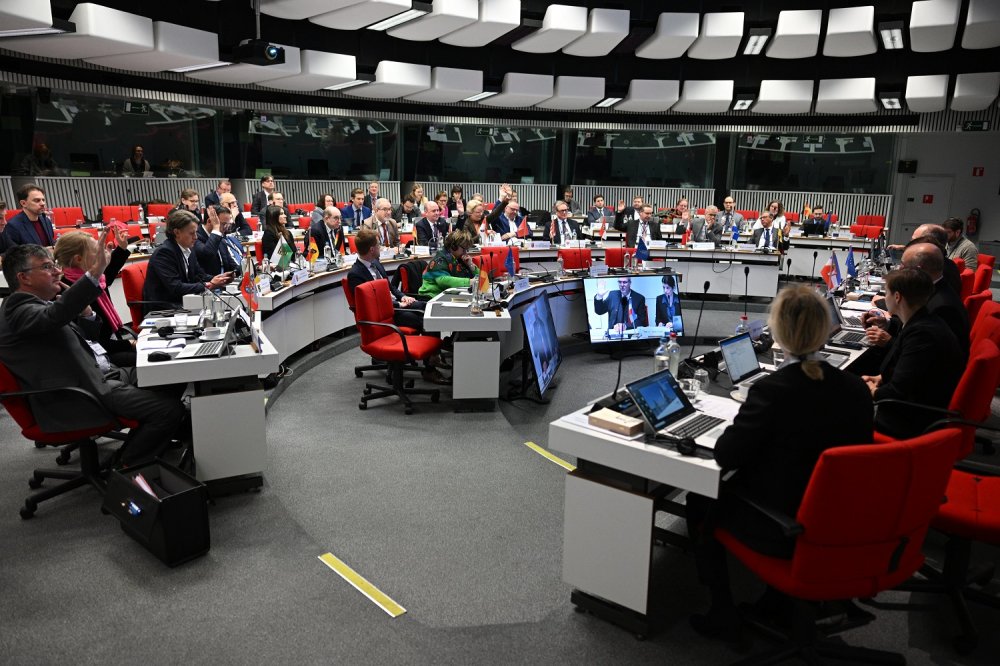News
- Details
- Published: 15 January 2024
Text: Marlene Riedel, Baltic Sea Strategy Point; Nikita Schlüter, Free and Hanseatic City of Hamburg
Even though the Baltic Sea Region has a long history of cooperation, and the EU Strategy for the Baltic Sea Region was the first of its kind, its implementation heavily relies on the commitment and ambition of each of the participating countries. Political support and ownership cannot be taken for granted, especially in a time of geopolitical changes and turmoil. This is why, the German Länder, and with Brandenburg, Mecklenburg-Vorpommern, Hamburg, and Schleswig-Holstein at the forefront, ramped up their efforts in committing to macro-regional cooperation in the Baltic Sea area.
German Europe Ministers commit to Baltic Sea Region cooperation
On 6–7 December 2023, the 93rd Conference of Ministers for European Affairs (EMC) of the 16 German Länder, chaired by Schleswig-Holstein, took place in Brussels with guests from the European Parliament, the European Commission and representatives from science and business.
On this occasion, the German European Affairs Ministers addressed the macro-regional strategies with German participation and put special focus on the EU Strategy for the Baltic Sea Region. They acknowledged the importance of cooperation in the Baltic Sea and Danube macro-regions which has significantly intensified since the start of the war of aggression against Ukraine: EMK Macro-regional Strategies with a focus on the EUSBSR
The Chairman of the Conference, Schleswig-Holstein's Minister for European Affairs, Werner Schwarz, said: "I am delighted that with these two resolutions on strengthening rural areas in the EU and on the EU Baltic Sea Strategy and the other macro-regional strategies with German participation, we have been able to address important concerns in these two priority areas of my EMC presidency directly with the decision-makers on the ground."
Almut Möller, State Secretary and Plenipotentiary of the Free and Hanseatic City of Hamburg to the Federal Government, the European Union and for Foreign Affairs, added: "The decision of the 93rd EMC to strengthen Baltic Sea cooperation is a contribution by the countries to the resilience of the democratic part of the Baltic Sea Region.” It is important to note that multilateral platforms such as the EU Baltic Sea Strategy contribute to increasing problem-solving competencies of neighbouring countries via joint approaches and knowledge-sharing.
The 93rd Conference of Ministers for European Affairs (EMC) of the 16 German Länder, chaired by Schleswig-Holstein, took place in Brussels with guests from the European Parliament, the European Commission and representatives from science and business. Photo: Simon Blackley
Baltic Sea cooperation in action: Hamburg’s role
Additionally, the Hamburg Senate Chancellery highlighted the city’s role in the implementation of the Strategy for the Baltic Sea Region: In the report, submitted to and requested by the Hamburg parliament, the Hamburg Senate Chancellery stated that as hosting organisation of the Baltic Sea Strategy Point, it will further develop and institutionally strengthen the Strategy’s support unit as central contact point for Baltic Sea cooperation.
Furthermore, as co-coordinator of the Policy Area Education, the Senate Chancellery commits to further expanding existing transnational cooperation structures, with a focus integrating migrants into the labour market, and science cooperation in the Region. Moreover, the report stressed the commitment to a broader involvement of young people in Baltic Sea cooperation, for example with the help of the CBSS Baltic Sea Youth Forum.
In conclusion, the recent developments in the Baltic Sea Region cooperation, spearheaded by Northern Germany mark a significant step forward in macro-regional collaboration. The commitment shown by the German Ministers for European Affairs along with the proactive initiatives of the city of Hamburg in implementing the Strategy for the Baltic Sea Region demonstrate how a unified push towards addressing macro-regional challenges can look like. This renewed focus not only strengthens the existing ties but also opens ways for more inclusive and sustainable cooperation, particularly in integrating diverse groups into the labour market and engaging youth in regional dialogues. As new geopolitical landscapes evolve, the importance of such collaborative efforts becomes ever more crucial, highlighting the Baltic Sea Region as a model of resilience and innovation in facing the challenges of our times.




